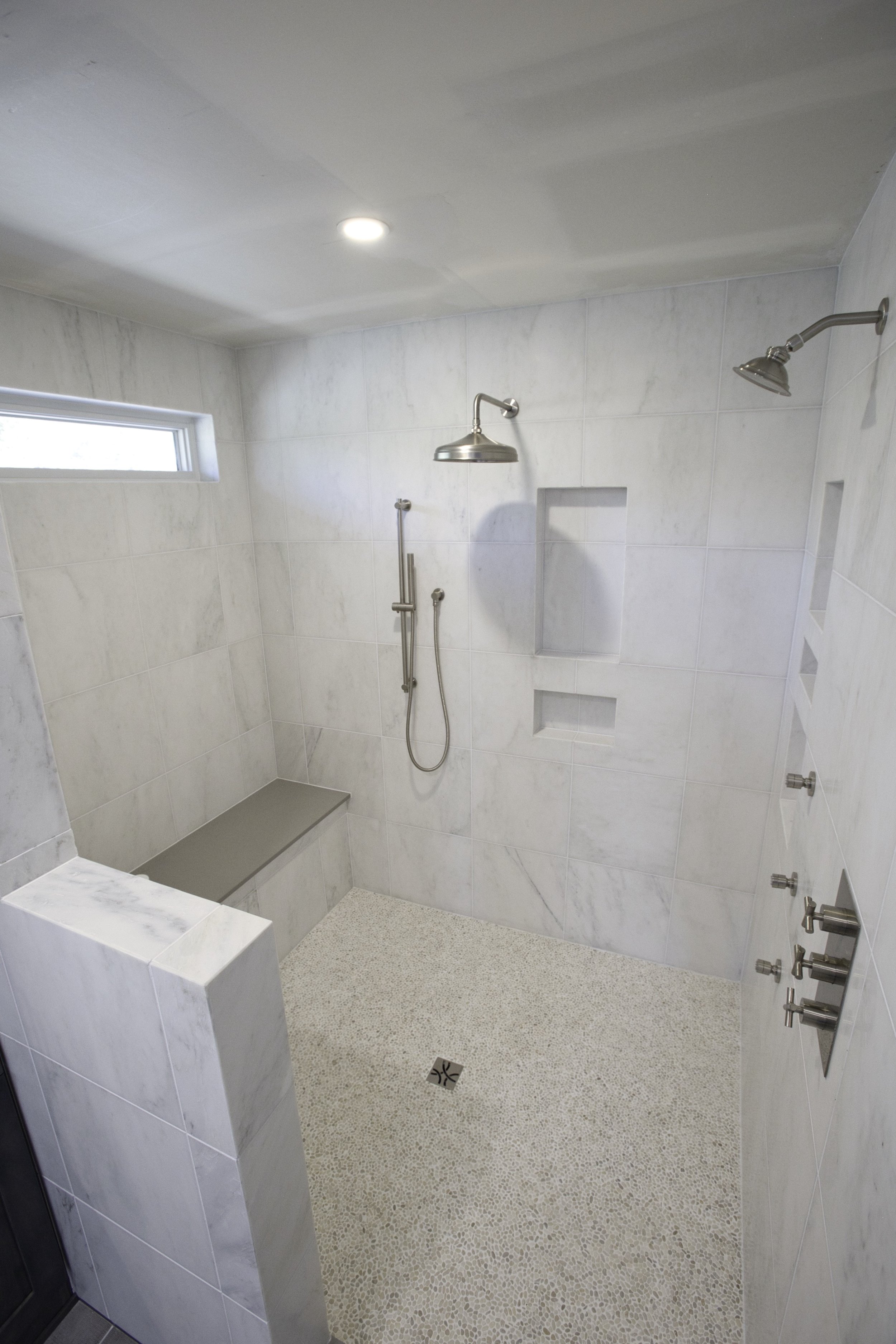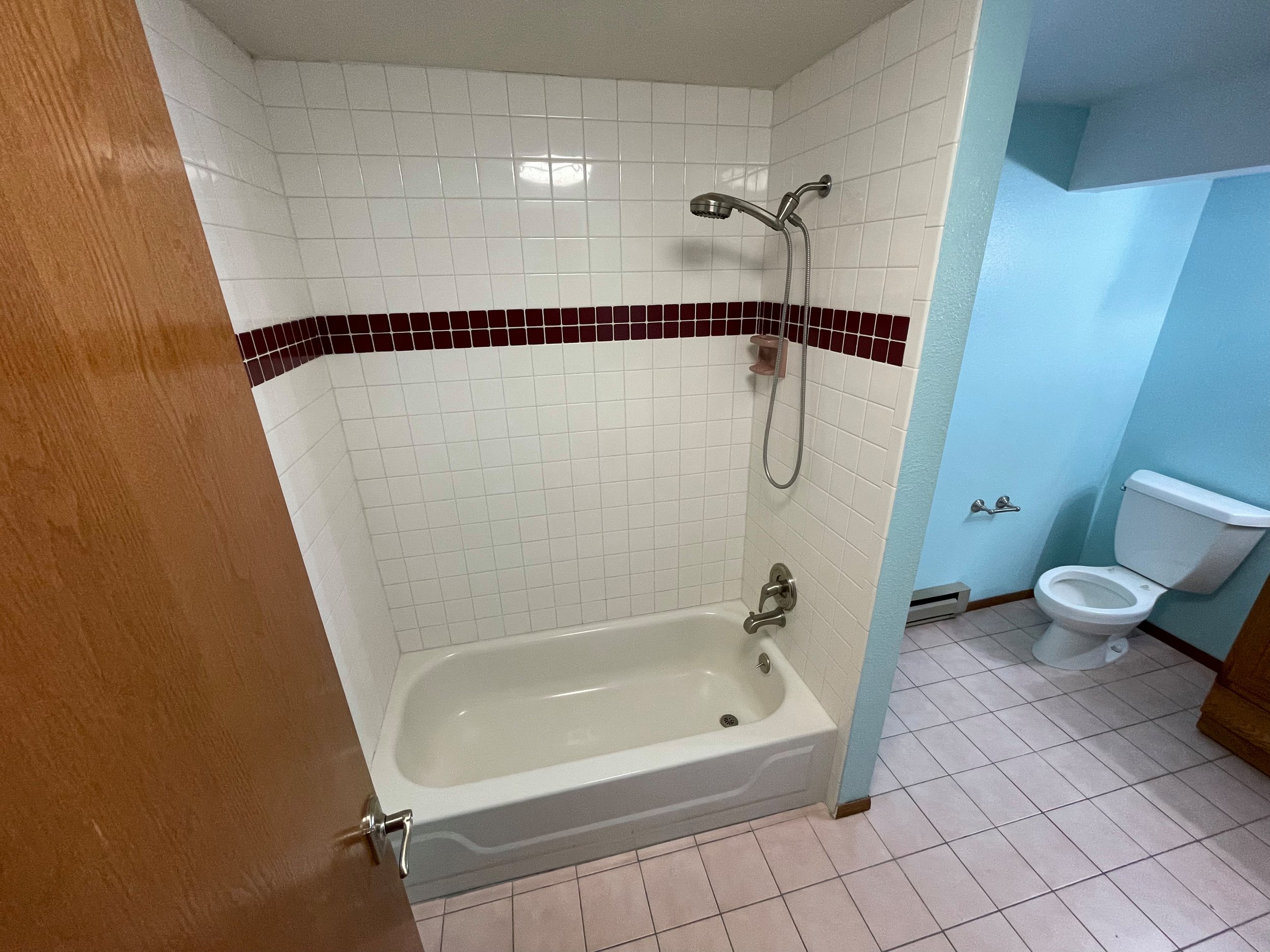How Much Should a Tub to Shower Conversion Cost in Colorado Springs 2025
Table of Contents
As a licensed contractor that has performed many tub to shower conversions, this is a guide to help you understand the costs to expect on a quote, as well as make you aware of the numerous different options available to you.
There can be a massive price difference between converting a tub to a simple yet functional shower and converting a tub to a luxurious shower. On average, you will be looking to spend $8000 for a tub to tiled shower conversion, but can be as cheap as $2600 or as expensive as $13,900+ depending on materials and design. (All prices in this article are based on a standard 32”x 60” tub to shower conversion).
In order to give the best possible price ranges to you, a few assumptions need to be made.
The tub never leaked, and the subfloor is in great condition.
There is no mold behind shower walls or subfloor.
The framing is level.
A shower door will be installed. If you prefer a curtain, then you can subtract the price of a shower door off the total for each section.
What factors affect the overall cost?
Demo:
Demolition in older homes can take longer due to lath and plaster walls, as well as potential hazards like asbestos or lead, which may require specialized mitigation. Bathroom location and access can increase costs, and additional protection for floors and walls adds to the expense.
Type of Shower:
Acrylic showers are significantly cheaper than tiled showers with multiple shower heads or body sprays.
Type of Shower Door:
Glass doors are much more expensive than curtains, with swinging glass doors costing more than sliding glass doors.
Type of Tile:
Tile prices vary widely, ranging from as low as $1.50/sqft to $25/sqft or more, depending on quality and style.
Shower Trim:
Shower heads, valves, wands, body sprays, grab bars, seats, and door handles all contribute to the cost of your renovation.
Plumbing:
Costs depend on whether plumbing needs to be moved or can remain in its current location.
Prefabricated Showers
Prefabricated showers are manufactured in a factory, purchased through home improvement stores or online retailers, and installed in your home. Constructed from materials like plastic, fiberglass, and composites, they are popular for their fast installation, affordability, and ease of maintenance.
There are two primary types of prefabricated showers: molded shower stalls, typically made from acrylic or fiberglass, and custom-cut solid surface shower systems, crafted from a variety of composite materials.
Acrylic/Fiberglass
Acrylic and fiberglass shower systems are very similar, both manufactured in specific sizes to fit seamlessly into existing tub stalls. They clip together and are fastened to the walls with screws, allowing for quick installation.
Thanks to their ease of installation and mass production, they are the most affordable shower option available.
Pros:
Easy to clean
Affordable
Easy to install
Cons:
If not sealed properly, water vapor can get through the seams and cause mold to build up behind the shower walls
Not very durable
Framing has to be exact for this to fit properly
Not very many color options
Not very luxurious
Solid Surface
Solid surface shower systems typically use an acrylic or fiberglass shower pan, paired with large sheets of composite materials for the walls. These systems offer more customization options, with a variety of colors and patterns available, and can be cut to fit your specific shower. Unlike acrylic and fiberglass options, the wall panels are glued to drywall or concrete board, rather than being fastened with screws.
Pros:
More color options
Fast install
Easy to clean
Cons:
If glue fails your shower will leak
Cost Breakdown
Acrylic/Fiberglass
Demo - $375-800
Plumbing - $500-1500
Materials -
Pan - $350+
Walls - $500+
Door - $200-1500
Install Labor - $675-1350
Total Costs = $2600 - 6000
Solid Surface
Demo - $375-800
Plumbing - $500-1500
Materials -
Pan - $350+
Walls - $700-1300
Door - $200-1500
Install Labor - $675-1350
Total Costs = $2800 - 6800
Tiled Showers
A tiled shower offers complete customization, with a vast selection of tiles ranging from ceramic, glass, porcelain, and natural stone. In addition to tiles, you can enhance your shower with features like a curb-less entry, shower bench, heated floor, shower niche, grab bars, and extra shower heads or sprays. These options let you design a shower that perfectly suits your preferences.
Unlike prefabricated shower systems, fully tiled showers (for both floors and walls) require full waterproofing and testing before tile installation to prevent potential leaks and water damage. This extra step adds labor costs to your project.
Tile setting is as much an art as it is a skill. A skilled tile setter will ensure perfect seams and joints, contributing to the higher labor costs. Depending on the type of tile and design, tiling a shower can take anywhere from 1 to 4 days.



Pros:
A more luxurious option
Variety of options to meet your specific style and desires
Will add value to your home
Much more durable than plastic
Cons:
Due to grout, these showers require more upkeep than a solid acrylic or fiberglass pan
If not waterproofed correctly they may leak causing thousands of dollars of damage
Much more labor intensive, so it will be more expensive
Cost Breakdown
Demo - $375-800
Plumbing - $500-2500
Materials and Labor - $4000-8500
Shower Door - $200-3000
Shower Door Labor - $375-600
Total = $5960-13,900 (average ~$8000)
Shower Niche
Many homeowners prefer an enclosure, like a niche, to store shampoo and soap, keeping the shower floor uncluttered. While a niche is both functional and visually appealing, it will increase the overall cost of your project.
When sloped and waterproofed correctly, a niche performs as intended. However, improper installation can lead to water pooling, potentially causing leaks, water damage, and mold growth behind the wall.
Shower Shelf
A shower shelf, like a niche, offers a convenient way to store soap and shampoo within the shower. While shelves are typically quicker to install than niches, they still add about a day to the project for framing, waterproofing, and tiling.
As with a niche, it’s essential for the shelf to be properly sloped to prevent water from leaking behind the wall, which can lead to damage.
Shower Bench
A shower bench is a highly functional addition to any shower, offering a relaxing place to sit, whether you're unwinding after a long day, need a spot to comfortably shave your legs, or prefer/need the accessibility of a seat while showering.
To enhance comfort further, many shower benches can be equipped with heating systems, ensuring that you don’t have to sit on cold tile. Heated benches not only provide a luxurious feel, but help maintain warmth in your shower, making your entire bathing experience more enjoyable.
Trim
Trim refers to the visual elements of your shower, including shower heads, valves, shower wands, and body sprays. With a variety of brands, styles, colors, and finishes available, trim offers a way to personalize the look and feel of your shower.
In addition, diverters can be installed to route water to multiple fixtures simultaneously, allowing you to use several shower features at once. However, this requires extensive rough plumbing before the tile installation, which will increase the overall cost of your project.
Types of Shower Doors
Framed Shower Door
$200 to $1500+
These shower doors are mounted on sturdy frames, typically made of heavy-duty aluminum. The frames may feature a sliding track for doors that glide or an integrated hinge for swinging doors. There are often several color options available for the aluminum, allowing you to coordinate the shower door with your shower trim for a cohesive look.
These are more affordable as the glass is usually thinner
Custom Shower Door
$2200+
A custom shower door is usually not necessary for a tub-to-shower conversion, as they are typically used for large, custom-sized showers with non-standard openings or when a pony wall is present. However, if you're planning to install a pony wall as part of your conversion, a custom shower door could be a great option. Both framed and frameless designs are available, allowing you to choose the style that best fits your vision.
Take a long time to get installed.
Once the tiled shower is completed, a glass company will visit your home to measure the enclosure and discuss design options with you. After confirming the design and measurements, the glass will be custom-cut and installed by the same company. The process can take anywhere from a couple of weeks to a couple of months, depending on lead times.
Frameless Shower Door
$500-$3000
These use a thicker glass, typically ⅜” compared to ¼” or less on framed doors
These look more minimalistic not having any additional metal blocking the view of your shower enclosure giving a more modern look
The only metal you will see is the hinge itself
Are often heavy and may require two people to safely install, so the installation cost may increase.
Demo Cost
Older homes often present unique challenges during the demolition phase of a bathroom remodel. Features like lath and plaster walls can take longer to remove, while the presence of hazardous materials such as asbestos or lead may require hiring a specialized mitigation team, significantly increasing the cost.
The location of the bathroom also plays a role in the complexity and cost of demolition. Bathrooms on higher floors or those with limited access to an egress point may require additional time and effort to transport debris, which can add to the overall expense.
Additionally, the need to protect other surfaces in your home—such as flooring, walls, or nearby furniture—can further contribute to the cost. These factors underscore the importance of careful planning and hiring an experienced contractor who understands the intricacies of working in older homes.
One of the easiest ways to save money on a bathroom remodel is to demo the bathroom yourself. Labor will be the most expensive part of you remodel, so any work you can do will cut down on the price
Cost range for tearing out a simple tub and tile surround 375-800. Factors that increase the demo are, type of tub, cast iron will be more expensive. Old houses - plaster and metal lath will be much harder to demo. If there is any mold behind old tub, additional drywall and even subfloor may need to be removed.
Hauling off garbage - A small dumpster is around $330/week, and dropping off a truckload may be as much as $250. It may be cheapest to get a small dumpster for the duration of the project for all garbage that will accumulate and to keep a clean work environment
Potential Hidden Costs
Water Damage
Permits - If you want to move the location of the drain, valve, or water lines. This will require a licensed plumber and will cost $50-200.
Drywall Repair - Depending on the type of shower enclosure, the drywall may need to be cut or could become damaged during installation, requiring repairs afterward.
Ways to Save Money if you are on a Budget
Do your own demo
Use pre-manufactured shower pan and wall surrounds
Use a shower curtain instead of a glass door
Do the install yourself
For those brave enough to take on the project, it can be a great learning experience. There are tons of great YouTube videos that will walk you through all of the steps. You will have to purchase a few new tools, but some of the more expensive ones can be rented from a local hardware store.









